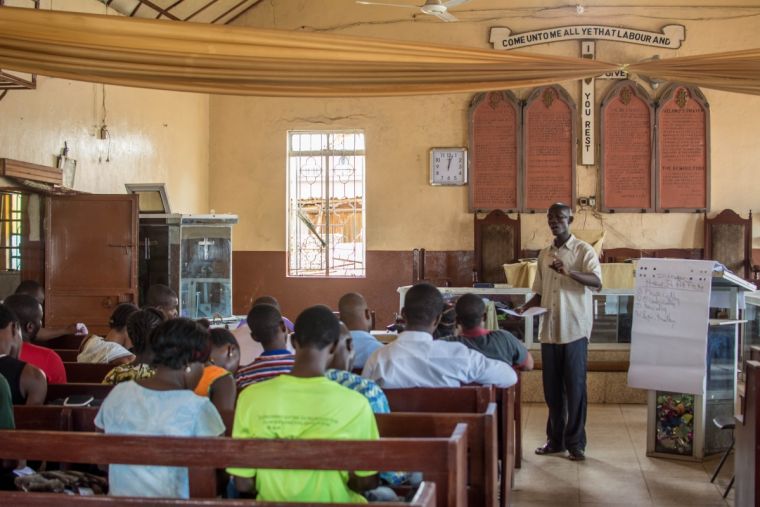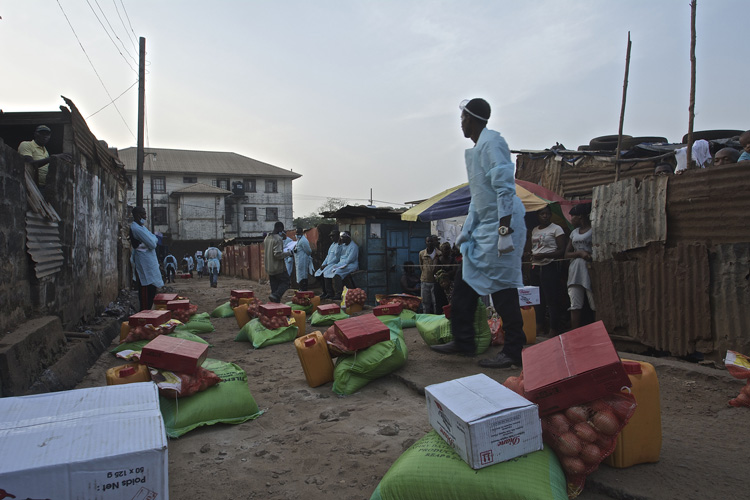Leaving no one behind: lessons from the Ebola epidemic

In 2013, I returned to the UK after three happy years of living and working in Sierra Leone for a charity that sought to improve health systems, knowledge and behaviour for vulnerable people. I bade farewell to my friends and colleagues, wishing them luck in their endeavours: jobs, families, political aspirations. The country was improving and there was a feeling of hope.
Tragically just one year later, in 2014, the Ebola outbreak took hold of the country and the region, and all hope was cast aside. The outbreak devastated lives, communities, economies and healthcare systems, and the work of recovery is not yet over.
Now seven years later, we can only watch as another virus outbreak threatens not only to jeopardise the health of a region, but of the world. My organisation Christian Aid, together with the global health community, learned a number of valuable lessons from our experience of supporting Sierra Leone's poor communities to reduce the spread of Ebola: all of these are relevant for mitigating the impact of the coronavirus (Covid-19) pandemic.
Firstly, the Ebola outbreak affirmed our long-standing belief in the importance of working through communities and, in particular, faith leaders. When Ebola first emerged, the global health community rushed to respond by building huge new treatment centres to deal with the ever-increasing number of cases. But it was only when the global response began making it a priority to work through communities to stem the spread of the virus – rather than just treating its victims – that the cases started to slow.
In Sierra Leone, people had a significant amount of distrust in health facilities, exacerbated by rumours and misconceptions about what the virus was, and how it spread. Without proper engagement with local communities, official communication about the virus only served to increase levels of fear and mistrust. Christian Aid and our longstanding local partners worked through our network of community elders and faith leaders. Trusted and respected, these women and men are often the gatekeepers to communities; they understand the cultural norms that shape people's actions, and therefore they can strongly influence their attitudes and behaviours.
We partnered with – and also trained – those local leaders to use their unique platforms to steer people's behaviours in ways that could mitigate the spread of the virus: namely, good hygiene methods, safe burial practices and quarantine procedures.
Working through local communities and gaining their trust will be a vital part of the response to Covid-19 as well, if (or perhaps when) it gains hold in the Global South. Communities themselves can be the most effective tool in combatting this virus, if we only give them the chance.
Secondly, we learned the importance of leaving no one behind. In times of crisis, more so than any other time, it is the poorest, most vulnerable and marginalised who are at greatest risk. We see this in the current demographic of those most adversely affected by Covid-19 i.e. the elderly, those with underlying health issues and compromised immune systems.

Now, with a growing number of confirmed cases in Africa, we are having to face the prospect that some of the world's poorest countries, with the weakest health systems and most vulnerable people, will be exposed to this deadly virus. In the Global South where people face even more intersecting vulnerabilities – for instance, people living with HIV who are also homeless, or have no fixed income or access to health services – it will be even more critical that we prioritise the most vulnerable and ensure their access to information and services.
Thirdly, we learned the (negative) power of stigma and discrimination. People suffering from and surviving Ebola were subjected to high levels of stigma. This in turn inhibited both the Ebola response and recovery, because people were reluctant to admit they had symptoms, and it limited their future chances of flourishing, since Ebola survivors have been discriminated against ever since. This has severely hampered their opportunities, be it educational, economic or otherwise. We must ensure we don't let stigma and discrimination impede our ability to control the Covid-19 outbreak, and ensure that survivors are not subjected to discrimination.
Christian Aid was in a good position to tackle the stigma and discrimination faced by Ebola survivors because of our long track record of shifting attitudes around HIV, and we drew upon our strong links with local partners and faith leaders to do so. Before, during and after the Ebola outbreak we also succeeded in improving levels of trust in health systems, levels of knowledge on health rights, and the levels of power people have to access their health rights, particularly amongst women and marginalised groups. We hope this will enable those communities – be it in Sierra Leone, Myanmar, Malawi or elsewhere – to face Covid-19 head on if they need to. But much more needs to be done.
Never before has the need for Universal Health Coverage been so evident: everyone, everywhere deserves to be able to access all the health services that they need, when they need them and without suffering financial hardship as a result. At present, at least half of the world's population still don't have this, according to the World Health Organisation.
Although Covid-19 does not discriminate who it targets – rich or poor – our experience has shown us that it will be the poorest who will bear the brunt. They will struggle to cope with any costs of healthcare, the costs of being unable to earn a living while ill or quarantined, and the costs of rebuilding their lives afterwards.
If Ebola has taught us one thing above all, it's that we desperately need Universal Health Coverage to ensure that the most marginalised and vulnerable citizens can access their right to health, both during times of crisis and times of stability.
Laura Adams is Health Programme Advisor for Christian Aid











